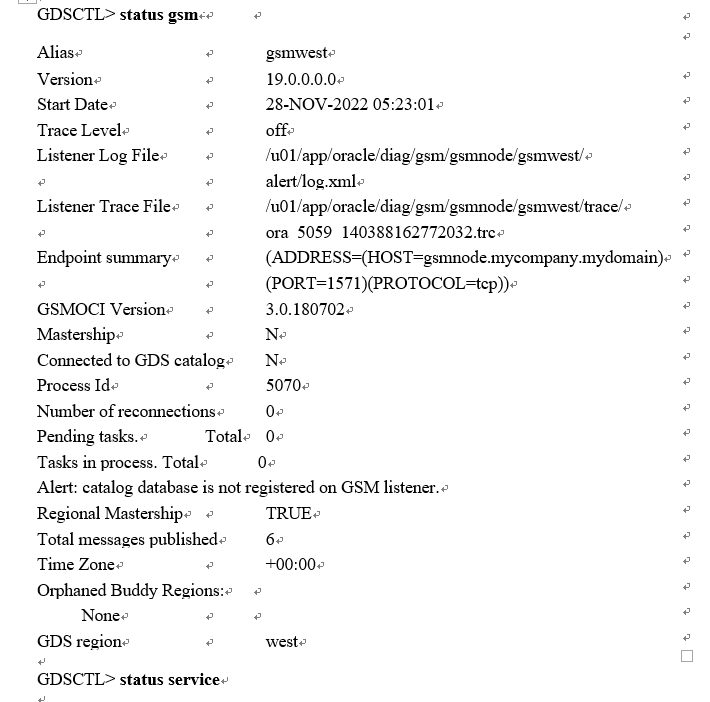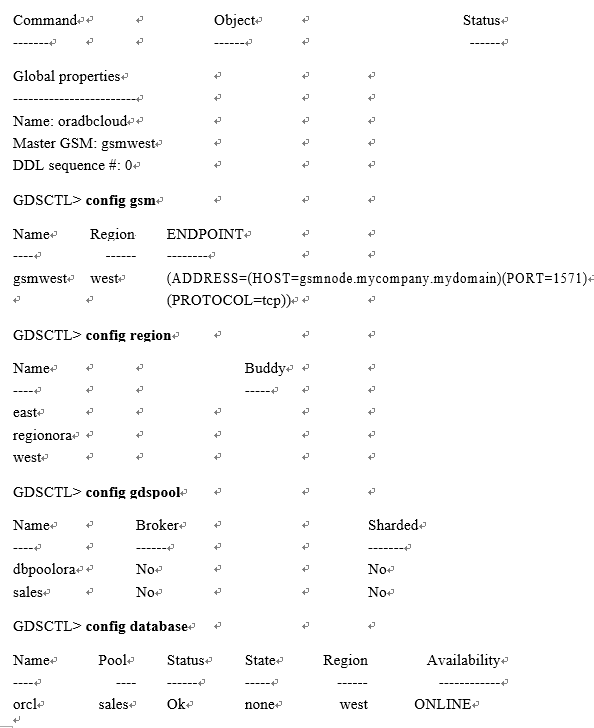GDS Restrictions, License, and Compatibility
GDS operates as a shared infrastructure, allowing a single GDS configuration to handle the following:
•\ Management of up to 300 database instances
•\ Support for 1,000 global services
•\ Provision of 20 GDS pools
•\ Organization of 10 GDS regions
•\ Availability of five GSMs per region
•\ Facilitation of 1,000 mid-tier connection pools The databases included in the GDS configuration need to fulfill the following requirements:
•\ Licensing for either Oracle Active Data Guard or Oracle GoldenGate is mandatory.
•\ The Oracle Database version must be Enterprise Edition (EE) 12.1 or higher.
•\ The deployment can be either a single Instance or a RAC configuration.
•\ The database can be Oracle multitenant or not.
•\ The deployment is compatible with Oracle Exadata and Oracle Database Appliance (ODA).
The following are the high-level steps involved in installation and configuration:
\ 1)\ Install GSM software on GSM servers, with a minimum of one GSM per region. According to best practices, it is recommended to have three GSMs per region.
\ 2)\ Set up GDS Administrator accounts and privileges. \ 3)\ Create a GDS catalog.
\ 4)\ Add GSM, regions, pools, databases, and global services. \ 5)\ Start services.
\ 6)\ Set up client connectivity.
\ 7)\ Adjust the settings in your application servers.
Comprehensive installation and configuration procedures will be covered in subsequent chapters, providing detailed guidance on the necessary steps.
Troubleshooting
The majority of troubleshooting time is spent on searching for information within logs. This section provides an overview of the various tools and logs that should be examined during the troubleshooting phase.
•\ GSM alert log location: /u01/app/oracle/diag/gsm/<GSM-node>/gsm?/trace/alert*.log
•\ GSM agent log: $ORACLE_HOME/data/agent.log
•\ GSM Listener Trace: GDSCTL> status
GSM tracing is enabled in the Global Data Services catalog database and all GDS pool databases using GWM_TRACE levels.
The following statement provides immediate tracing, but the trace is disabled after a database restart:
SQL> alter system set events ‘immediate trace name GWM_TRACE level 7’;
The following statement enables tracing that continues in perpetuity, but only after restarting the database:
SQL> ALTER SYSTEM SET EVENT=’10798 trace name context forever, level 7′ SCOPE=spfile;
To enhance safety, it is advisable to enable both traces.
To trace everything, you will need to set this on the GDS catalog and all GDS pool databases. The traces are written to the RDBMS session trace file for either the GDSCTL session (on the GDS catalog) or the sessions created by the GSMs (on the GDS pool databases).

The status command can be used to obtain the running status of the GDS components, as shown here:

Service “salesrv.sales.oradbcloud” has 2 instance(s). Affinity: ANYWHERE
Instance “sales%1”, name: “orcl1”, db: “orcl”, region: “west”,
status: ready.
Instance “sales%2”, name: “orcl2”, db: “orcl”, region: “west”,
status: ready.
GDSCTL> status database
Database: “orcl” Registered: Y State: Ok ONS: Y. Role: PRIMARY Instances: 2
Region: west
Service: “salesrv” Globally started: Y Started: Y
Scan: N Enabled: Y Preferred: Y Registered instances:
sales%1
sales%2
The gdsctl config command can be used to obtain the static configuration information of various GDS components.
GDSCTL> config
Regions
————————
east
regionora
west
GSMs
————————
gsmwest
GDS pools
————————
dbpoolora
sales
Databases
————————
orcl
Services
————————
salesrv
GDSCTL pending requests
————————


You can enable tracing using the set trace_level command from the GDSCTL command-line interface.
GDSCTL> set trace_level -gsm gsm_name SUPPORT trace_level is set to SUPPORT
The SUPPORT option provides a trace with troubleshooting information for Oracle Support Services. The other options are ADMIN and USER.
To disable tracing, use this:
GDSCTL> set trace_level -gsm gsm_name OFF trace_level is set to OFF
The exact location of a given global service manager’s log and trace files can be obtained using the status gsm command.
GDSCTL> status gsm